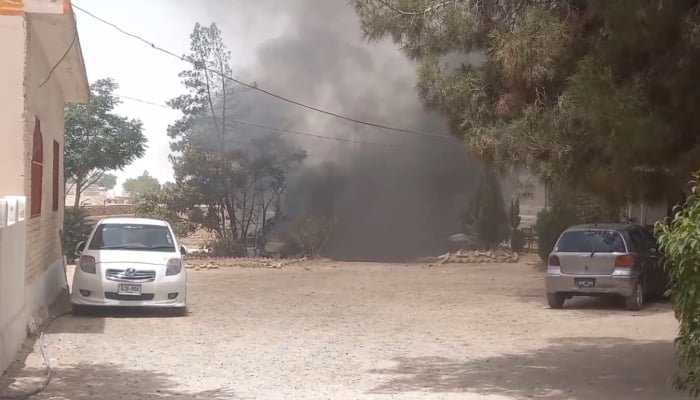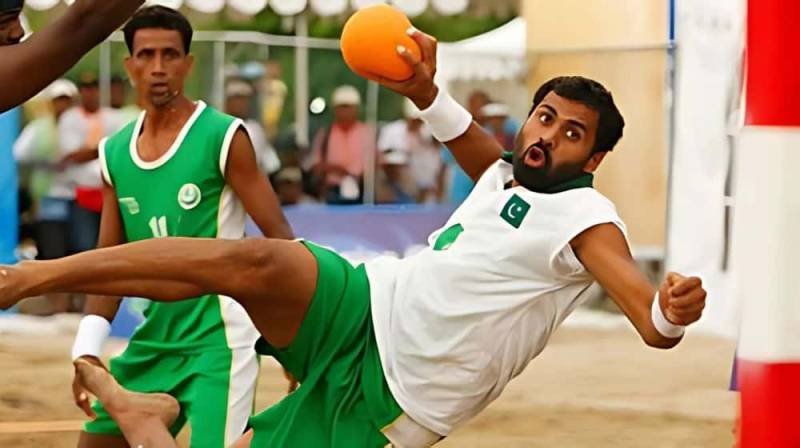Terror Strikes Mastung: Security Forces Eliminate Two Militants in Deadly Attack on Levies Line
By Salman Ashraf | July 1, 2025
Mastung, Balochistan: In a violent escalation of terrorist activity in Balochistan, armed militants launched a brutal attack on the Levies Line in Mastung on Tuesday, leaving behind a trail of devastation. According to officials from the district administration, the attack resulted in the death of at least two terrorists, a 16-year-old civilian, and injuries to seven others. Several vehicles were torched as thick black smoke rose over the town, marking yet another dark day for the violence-stricken province.
The Attack: A Coordinated Strike on Security Infrastructure
Eyewitnesses and local sources report that the attack was executed in broad daylight near the Levies Line headquarters, a critical security hub in the region. The militants, heavily armed and reportedly well-coordinated, first opened fire on the premises, creating chaos among the personnel and local civilians. The sound of gunfire echoed across the area, followed by multiple explosions, presumably caused by improvised explosive devices (IEDs) or grenades hurled by the attackers.
Security personnel responded swiftly, engaging in a fierce gun battle with the assailants. The confrontation lasted for over an hour, during which multiple rounds were exchanged. According to the district administration, two militants were killed on the spot while three others sustained injuries but managed to flee the scene amid the chaos.
A 16-year-old boy, identified as Muhammad Rizwan, tragically lost his life during the crossfire. Locals described him as a bright and kind-hearted teenager who had just returned home after attending a school seminar earlier that day.
Casualties and Emergency Response
Seven other individuals, including security personnel and civilians, sustained serious injuries in the incident. Emergency services rushed to the scene, and the injured were transported to Nawab Ghous Bakhsh Raisani Hospital in Mastung for urgent medical care. Hospital officials confirmed that the injured were in stable condition but remained under close observation due to the severity of their wounds.
Dr. Khalid Shahwani, Chief Medical Officer at the hospital, stated:
“Our staff responded promptly, and we were able to stabilize the injured within the critical golden hour. However, the psychological trauma faced by survivors and local residents is immeasurable.”
Balochistan Government Reacts Swiftly
In response to the incident, Balochistan government spokesperson Shahid Rind issued a public statement condemning the attack and confirming that Indian-sponsored militants were responsible. He claimed the attackers had also targeted a nearby bank and local government offices, including the Tehsil administration center.
Rind emphasized the swift and effective reaction by security forces, which, he said, prevented the attack from becoming a larger massacre.
“Security personnel surrounded the terrorists immediately. Two were neutralized during the exchange of fire, and three others were injured. The quick and coordinated response saved countless lives.”
He further added that a comprehensive clearance operation was underway in the area and that security forces were actively tracking down the facilitators and handlers of the assailants.
Smoke and Fear Hang Over Mastung
A video clip circulating on social media showed dense smoke billowing from the site of the attack as residents filmed the terrifying scene from rooftops and alleyways. Terrified families remained indoors while children cried and sirens blared in the background.
Local resident Najeeb Ullah described the ordeal:
“We heard a loud explosion followed by continuous gunfire. We thought war had broken out in our town. My children were screaming. We locked the doors and prayed for safety.”
The visuals from the site reflected the extent of the violence—charred vehicles, bullet-ridden walls, and blood-stained streets—turning a once-busy administrative hub into a battlefield.
Surge in Militant Attacks Across Pakistan in May 2025
This attack comes on the heels of rising concerns over a recent uptick in terrorist activities across Pakistan. According to data released by the Pakistan Institute for Conflict and Security Studies (PICSS), May 2025 saw a 5% increase in militant attacks compared to April. The think tank recorded a total of 85 attacks nationwide in May, up from 81 the previous month.
These attacks collectively claimed 113 lives and left 182 people injured. Among the deceased were 52 members of the security forces, 46 civilians, 11 militants, and four peace committee members.
A deeper analysis of the data reveals a troubling trend—security personnel deaths surged by 73%, a significant spike indicating that Pakistan’s armed forces are increasingly becoming direct targets of militant aggression. Civilian injuries also increased dramatically, jumping 145% from 53 in April to 130 in May.
Balochistan: The Epicenter of Violence
Out of the 85 attacks in May, 35 occurred in Balochistan alone, accounting for 41% of the total fatalities. These attacks killed 51 people, including 30 civilians, 18 security personnel, and three militants. The province continues to be the most affected region, followed closely by Khyber Pakhtunkhwa (KP).
Security experts attribute this rise in violence to both regional instability and the persistent presence of separatist and extremist elements in the province. Mastung, in particular, has been a hotspot for terrorist incidents due to its strategic location and historical volatility.
Security Forces Strike Back: Militants Killed in Operations
Despite the increasing threat, Pakistan’s security forces have remained proactive. In the same month of May, at least 59 militants were neutralized in various operations across the country. Five members of the armed forces were also martyred during these counter-insurgency efforts.
Combining both militant attacks and retaliatory operations, the total casualty toll for May stood at 172, including 57 security personnel, 65 militants, 46 civilians, and four peace committee members. The numbers highlight the ongoing war between law enforcement agencies and militant groups.
Pakistan’s Counterterrorism Strategy: Challenges Ahead
While the immediate response to Tuesday’s attack was swift and effective, long-term strategies remain a topic of concern. The recurrence of such high-profile attacks raises critical questions about intelligence failures, gaps in surveillance, and the urgent need for stronger border security—particularly with Afghanistan and Iran, from where many of these groups are believed to operate.
Security analyst Ayesha Malik noted:
“There’s no doubt that Pakistan’s security apparatus is committed and capable, but we need to revamp our counterterrorism framework to address the evolving nature of threats. Hybrid warfare, propaganda, and foreign-sponsored militancy require modern tools and greater regional cooperation.”
The Balochistan government, in coordination with federal agencies, is reportedly developing a new provincial security policy focusing on intelligence-sharing, increased surveillance, and border checkpoints to monitor militant movement.
Civilian Impact: Fear, Trauma, and Displacement
Beyond the numbers, the impact of this violence on civilians is profound. Families living in conflict-prone areas like Mastung live under constant fear. The trauma of hearing explosions and gunfire has become a tragic part of life for many.
The attack has also triggered a fresh wave of internal displacement, as families in the affected zone have begun relocating to safer areas. Schools in Mastung were closed for 48 hours following the attack, and businesses suffered severe losses.
A Call for Unity and Vigilance
Prime Minister Shehbaz Sharif, while expressing deep sorrow over the Mastung incident, called on all political and social factions to unite in condemning terrorism and supporting the armed forces.
“The blood of our youth must not be spilled in vain. We will avenge every innocent life taken and ensure these terrorists are brought to justice.”
The PM also urged media houses to exercise responsibility while reporting on security incidents and called for greater public awareness about how civilians can contribute to national security by reporting suspicious activities.
The Way Forward
As the smoke clears from the charred remains of the Levies Line compound, Pakistan once again finds itself at a crossroads. On one hand, the bravery and quick response of security forces offer a glimmer of hope. On the other, the rising frequency and brutality of such attacks underline the steep road ahead.
Mastung’s tragedy is not just a reflection of regional violence; it is a stark reminder of the continuing battle for peace and stability in Pakistan. The resilience of its people, the courage of its defenders, and the unity of its institutions will determine how this war is won—not just with weapons, but with vision, strategy, and unshakeable national resolve.
Terror Strikes Mastung: Security Forces Eliminate Two Militants in Deadly Attack on Levies Line
By Salman Ashraf | July 1, 2025
Mastung, Balochistan: In a violent escalation of terrorist activity in Balochistan, armed militants launched a brutal attack on the Levies Line in Mastung on Tuesday, leaving behind a trail of devastation. According to officials from the district administration, the attack resulted in the death of at least two terrorists, a 16-year-old civilian, and injuries to seven others. Several vehicles were torched as thick black smoke rose over the town, marking yet another dark day for the violence-stricken province.
___________________________________________________________________________________
Join Pakistan Army as a Nurse: Registration Begins! power 7
Read This Article
___________________________________________________________________________________
The Attack: A Coordinated Strike on Security Infrastructure
Eyewitnesses and local sources report that the attack was executed in broad daylight near the Levies Line headquarters, a critical security hub in the region. The militants, heavily armed and reportedly well-coordinated, first opened fire on the premises, creating chaos among the personnel and local civilians. The sound of gunfire echoed across the area, followed by multiple explosions, presumably caused by improvised explosive devices (IEDs) or grenades hurled by the attackers.
Security personnel responded swiftly, engaging in a fierce gun battle with the assailants. The confrontation lasted for over an hour, during which multiple rounds were exchanged. According to the district administration, two militants were killed on the spot while three others sustained injuries but managed to flee the scene amid the chaos.
A 16-year-old boy, identified as Muhammad Rizwan, tragically lost his life during the crossfire. Locals described him as a bright and kind-hearted teenager who had just returned home after attending a school seminar earlier that day.
Casualties and Emergency Response
Seven other individuals, including security personnel and civilians, sustained serious injuries in the incident. Emergency services rushed to the scene, and the injured were transported to Nawab Ghous Bakhsh Raisani Hospital in Mastung for urgent medical care. Hospital officials confirmed that the injured were in stable condition but remained under close observation due to the severity of their wounds.
Dr. Khalid Shahwani, Chief Medical Officer at the hospital, stated:
“Our staff responded promptly, and we were able to stabilize the injured within the critical golden hour. However, the psychological trauma faced by survivors and local residents is immeasurable.”
Balochistan Government Reacts Swiftly
In response to the incident, Balochistan government spokesperson Shahid Rind issued a public statement condemning the attack and confirming that Indian-sponsored militants were responsible. He claimed the attackers had also targeted a nearby bank and local government offices, including the Tehsil administration center.
Rind emphasized the swift and effective reaction by security forces, which, he said, prevented the attack from becoming a larger massacre.
“Security personnel surrounded the terrorists immediately. Two were neutralized during the exchange of fire, and three others were injured. The quick and coordinated response saved countless lives.”
He further added that a comprehensive clearance operation was underway in the area and that security forces were actively tracking down the facilitators and handlers of the assailants.
Smoke and Fear Hang Over Mastung
A video clip circulating on social media showed dense smoke billowing from the site of the attack as residents filmed the terrifying scene from rooftops and alleyways. Terrified families remained indoors while children cried and sirens blared in the background.
Local resident Najeeb Ullah described the ordeal:
“We heard a loud explosion followed by continuous gunfire. We thought war had broken out in our town. My children were screaming. We locked the doors and prayed for safety.”
The visuals from the site reflected the extent of the violence—charred vehicles, bullet-ridden walls, and blood-stained streets—turning a once-busy administrative hub into a battlefield.
Surge in Militant Attacks Across Pakistan in May 2025
This attack comes on the heels of rising concerns over a recent uptick in terrorist activities across Pakistan. According to data released by the Pakistan Institute for Conflict and Security Studies (PICSS), May 2025 saw a 5% increase in militant attacks compared to April. The think tank recorded a total of 85 attacks nationwide in May, up from 81 the previous month.
These attacks collectively claimed 113 lives and left 182 people injured. Among the deceased were 52 members of the security forces, 46 civilians, 11 militants, and four peace committee members.
A deeper analysis of the data reveals a troubling trend—security personnel deaths surged by 73%, a significant spike indicating that Pakistan’s armed forces are increasingly becoming direct targets of militant aggression. Civilian injuries also increased dramatically, jumping 145% from 53 in April to 130 in May.
Balochistan: The Epicenter of Violence
Out of the 85 attacks in May, 35 occurred in Balochistan alone, accounting for 41% of the total fatalities. These attacks killed 51 people, including 30 civilians, 18 security personnel, and three militants. The province continues to be the most affected region, followed closely by Khyber Pakhtunkhwa (KP).
Security experts attribute this rise in violence to both regional instability and the persistent presence of separatist and extremist elements in the province. Mastung, in particular, has been a hotspot for terrorist incidents due to its strategic location and historical volatility.
Security Forces Strike Back: Militants Killed in Operations
Despite the increasing threat, Pakistan’s security forces have remained proactive. In the same month of May, at least 59 militants were neutralized in various operations across the country. Five members of the armed forces were also martyred during these counter-insurgency efforts.
Combining both militant attacks and retaliatory operations, the total casualty toll for May stood at 172, including 57 security personnel, 65 militants, 46 civilians, and four peace committee members. The numbers highlight the ongoing war between law enforcement agencies and militant groups.
Pakistan’s Counterterrorism Strategy: Challenges Ahead
While the immediate response to Tuesday’s attack was swift and effective, long-term strategies remain a topic of concern. The recurrence of such high-profile attacks raises critical questions about intelligence failures, gaps in surveillance, and the urgent need for stronger border security—particularly with Afghanistan and Iran, from where many of these groups are believed to operate.
Security analyst Ayesha Malik noted:
“There’s no doubt that Pakistan’s security apparatus is committed and capable, but we need to revamp our counterterrorism framework to address the evolving nature of threats. Hybrid warfare, propaganda, and foreign-sponsored militancy require modern tools and greater regional cooperation.”
The Balochistan government, in coordination with federal agencies, is reportedly developing a new provincial security policy focusing on intelligence-sharing, increased surveillance, and border checkpoints to monitor militant movement.
Civilian Impact: Fear, Trauma, and Displacement
Beyond the numbers, the impact of this violence on civilians is profound. Families living in conflict-prone areas like Mastung live under constant fear. The trauma of hearing explosions and gunfire has become a tragic part of life for many.
The attack has also triggered a fresh wave of internal displacement, as families in the affected zone have begun relocating to safer areas. Schools in Mastung were closed for 48 hours following the attack, and businesses suffered severe losses.
A Call for Unity and Vigilance
Prime Minister Shehbaz Sharif, while expressing deep sorrow over the Mastung incident, called on all political and social factions to unite in condemning terrorism and supporting the armed forces.
“The blood of our youth must not be spilled in vain. We will avenge every innocent life taken and ensure these terrorists are brought to justice.”
The PM also urged media houses to exercise responsibility while reporting on security incidents and called for greater public awareness about how civilians can contribute to national security by reporting suspicious activities. terrorists.
The Way Forward
As the smoke clears from the charred remains of the Levies Line compound, Pakistan once again finds itself at a crossroads. On one hand, the bravery and quick response of security forces offer a glimmer of hope. On the other, the rising frequency and brutality of such attacks underline the steep road ahead.
Mastung’s tragedy is not just a reflection of regional violence; it is a stark reminder of the continuing battle for peace and stability in Pakistan. The resilience of its people, the courage of its defenders, and the unity of its institutions will determine how this war is won—not just with weapons, but with vision, strategy, and unshakeable national resolve.




